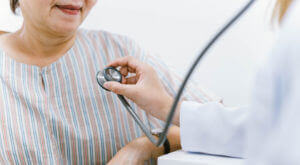
There are medical conditions that put you at risk for heart disease. The scary thing about heart disease is that it can produce no symptoms that would alert you to see a doctor. For many people, heart disease is discovered after a routine check-up. One example of heart disease with no symptoms is coronary heart disease, which is a condition marked by the poor supply of blood to the heart. Coronary heart disease is a risk factor for heart attack and stroke, both potentially fatal incidents.
A heart doctor or cardiologist specializes in treating heart conditions and can help you prevent their progression and reduce your risk of potentially fatal outcomes. If you feel okay now, should you see a cardiologist? Here are signs it may be time to make an appointment with a cardiologist.
Your PCP Has Recommended It
If your primary care physician has made a recommendation to see a cardiologist, it’s likely due to their assessment of your health risks based on your medical history and lifestyle. If your family has a history of heart disease, your PCP may recommend that you see a cardiologist. Prevention is still the best form of treatment, and a cardiologist is a heart expert, the specialist to see for an individualized prevention plan. Your PCP could also refer you to a cardiologist if test results reveal a heart problem, in which case you should not delay making an appointment.
You Experience Chest Pain
Chest pain is a very common symptom of heart problems. A cardiologist can determine the cause of chest pain and recommend the appropriate treatment. Chest pain is also a symptom of a heart attack, or you could have had one (a silent heart attack) without knowing it. Imaging results will reveal a history of heart attacks.
High Total Cholesterol and High Blood Pressure
High cholesterol levels of 200 mg/dL or higher are a risk factor for heart disease, and so is high blood pressure. High blood pressure means a stronger force of blood pushing against the artery walls. It means your heart has to work harder to pump blood to the rest of your body. Cholesterol is a waxy substance that can collect in your arteries, interfering with normal blood flow. Both are risk factors for heart attack and stroke.
You Smoke or Used To Smoke
The toxic chemicals in cigarettes can accelerate the formation of plaque in your arteries and increase your blood pressure. It can also affect oxygen levels of blood going to the heart and damage cells in the arteries.
You Have Type 2 Diabetes
Type 2 diabetes affects every bodily function and is a risk factor for heart disease. Your PCP will recommend you see different specialists, including a cardiologist. High blood sugar levels can damage your blood vessels and nerves that control heart function.
You Want To Start a New Exercise Program
If you have been inactive and want to start exercising, that’s great! However, do it safely and don’t overwork your heart, especially if you have a heart condition. Your cardiologist can recommend heart-healthy exercises that will still allow you to reap the benefits of physical activity.
Cardiologist in New Jersey
At Hudson MD Group, we have cardiologists on our team of providers who are ready to help care for your heart health and manage and treat existing heart conditions. We provide personalized care for every patient. To make an appointment with a cardiologist, call our clinic at (973) 705-4914 or make an appointment request online now.


